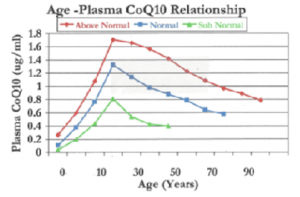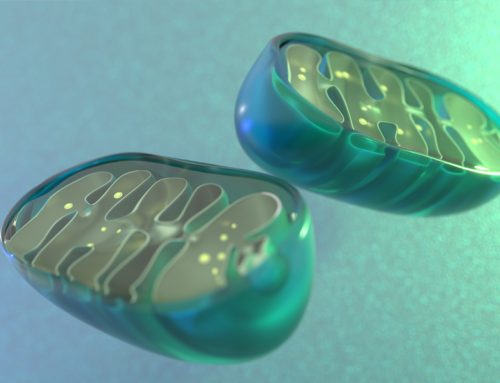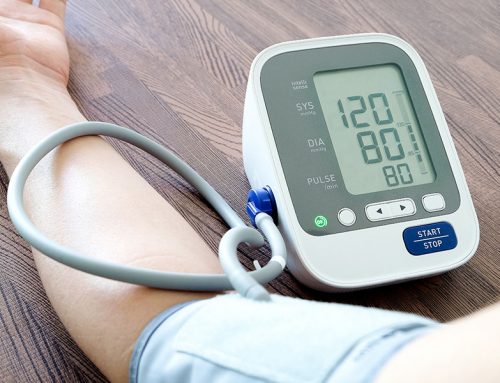
Coenzyme Q10 (ubiquinone) is ubiquitous in human tissues; however, its concentration levels vary. Concentrations are highest in organs with high rates of metabolism, e.g. the heart, the kidneys, the liver. The bio-synthesis and thus the whole body content of Coenzyme Q10 decreases with increasing age in the adult years. Adequate concentrations of Coenzyme Q10 are essential for the health of nearly all human cells and tissues because Coenzyme Q10 is vital for the process of ATP energy generation and because it is an important lipid antioxidant.
Coenzyme Q10 adjunctive treatment of chronic heart failure patients significantly improves their symptoms and survival [Mortensen 2014]. A recent survey of the scientific literature shows that Coenzyme Q10 supplementation is safe, well-tolerated, and effective as an adjunctive treatment in various disease conditions that involve high cellular and tissue demands for energy and in diseases involving oxidative stress and inflammation [Garrido-Maraver 2014].
Coenzyme Q10 is a naturally occurring essential nutrient. In human cells, it is a vital co-factor in the process of ATP energy generation and one of the most important lipid antioxidants. In this article, I summarize briefly the results of some of the recent scientific research using Coenzyme Q10 as an active treatment compared to a placebo treatment.
Antioxidant activity:
Coenzyme Q10 supplementation in doses ranging from 150 to 300 milligrams daily is associated with increased activity of the enzymatic antioxidants [Liu 2016; Lee 2012]:
- superoxide dismutase
- catalase
- glutathione peroxidase
Breast cancer:
A systematic review of the research literature shows that the evidence for the efficacy of Coenzyme Q10 adjunctive treatment in breast cancer care is thin but promising. Research shows that Coenzyme Q10 levels are low in breast cancer patients [Tafazoli 2017].
Chronic fatigue syndrome:
A randomized controlled study shows that daily supplementation of chronic fatigue syndrome patients with 200 milligrams of Coenzyme Q10 and 20 milligrams of nicotinamide adenine dinucleotide (NADH) significantly reduces the patients' maximum heart rate during a cycle ergometer test in the 8th week versus baseline heart rate [Castro-Marrero 2016].
Diabetes:
A systematic review and meta-analysis shows that Coenzyme Q10 supplements are safe for diabetics to take [Moradi 2016].
A randomized, double-blind, and placebo-controlled study shows that Coenzyme Q10 supplements have a positive effect on oxidative stress markers in non-proliferative diabetic retinopathy [Rodríguez-Carrizalez 2016].
Dialysis:
A randomized, double-blind, parallel-group, placebo-controlled clinical trial shows that supplementation of patients undergoing maintenance dialysis with 1200 milligrams of Coenzyme Q10 daily for four months is safe and effective at reducing a bio-marker of oxidative stress [Rivara 2017].
Fibromyalgia:
A randomized controlled study shows that supplementation with 300 milligrams of Coenzyme Q10 for 40 days reduced the fatigue, pain, and morning tiredness experienced by fibromyalgia patients [Cordero 2013].
Heart failure:
A new meta-analysis shows that patients with heart failure who used Coenzyme Q10 had significantly lower mortality and significantly higher exercise capacity improvement than the placebo-treated patients with heart failure [Lei 2017].
Dr. Stephen Sinatra's summary of the results of the important clinical studies of Coenzyme Q10 supplementation and heart health benefits documents the need for Coenzyme Q10 as an adjunctive treatment in chronic heart failure [Sinatra 2018].
Inflammation:
A 2017 meta-analysis shows that Coenzyme Q10 supplementation significantly lowers the concentrations of bio-markers of low-grade systemic inflammation [Fan 2017].
Metabolic syndrome:
A study of patients diagnosed with metabolic syndrome shows that 100 milligrams of Coenzyme Q10 supplementation daily for eight weeks has beneficial effects on serum insulin concentrations, glucose homeostasis parameters, and bio-markers of oxidative stress [Raygan 2016].
Migraine:
Two independent randomized controlled trials show that Coenzyme Q10 supplementation is associated with significant decreases in migraine attacks [Dahri 2018; Shoeibi 2017]:
- decreased frequency
- decreased duration
- decreased intensity
Multiple sclerosis:
Coenzyme Q10 supplementation is associated with beneficial health outcomes in multiple sclerosis patients [Sanoobar 2013, 2015]:
- significantly reduced levels of depression and fatigue
- significantly reduced levels of inflammation and oxidative stress
- significantly increased activity of enzymatic antioxidants
Oxidative stress:
A survey of the scientific literature shows that Coenzyme Q10 supplementation is safe, well-tolerated, and effective as an adjunctive treatment in diseases that involve high cellular and tissue demands for energy and in diseases involving oxidative stress and oxidative damage [Garrido-Maraver 2014].
Statins:
Daily adjunctive treatment of patients taking statin medications with 2.52 grams of omega-3 polyunsaturated fatty acids and 200 milligrams of Coenzyme Q10 is associated with beneficial effects on lipid and non-lipid parameters related to the possible adverse effects of statin medications [Tóth 2017].
Adequate concentrations of Coenzyme Q10 are needed for optimal cellular ATP energy generation. Statin medications inhibit the bio-synthesis of Coenzyme Q10 and may impair muscle function in the heart and blood vessels through the depletion of Coenzyme Q10 [Okuyama 2015].
Coenzyme Q10 supplements' efficacy well documented
Low levels of plasma Coenzyme Q10 are associated with increased risk of a number of diseases and with increased risk of ageing-related degenerative diseases. The efficacy of well-formulated Coenzyme Q10 supplements is well documented:
- Q-Symbio study: 300 milligrams of Coenzyme Q10 (100 milligrams three times daily, with meals) daily for two years improved the symptoms and survival of chronic heart failure patients [Mortensen 2014].
- KiSel-10 study: 200 milligrams of Coenzyme Q10 (100 milligrams two times daily, with meals) daily in combination with 200 micrograms of a high-selenium yeast supplement for four years reduced the risk of death from heart disease. The beneficial effect persisted for ten years [Alehagen 2015].
Coenzyme Q10's efficacy is attributed to its improvement of mitochondrial function in the production of ATP energy and to its antioxidant protection of cells and tissues affected by oxidative stress.
The key to good performance by a Coenzyme Q10 supplement is the formulation of the Coenzyme Q10 inside the soft-gel capsule.
Sources
Alehagen, U., Aaseth, J., & Johansson, P. (2015). Reduced Cardiovascular Mortality 10 Years after Supplementation with Selenium and Coenzyme Q10 for Four Years: Follow-Up Results of a Prospective Randomized Double-Blind Placebo-Controlled Trial in Elderly Citizens. Plos One, 10(12), e0141641.
Castro-Marrero, J., Sáez-Francàs, N., Segundo, M. J., Calvo, N., Faro, M., Aliste, L., & Alegre, J. (2016). Effect of coenzyme Q10 plus nicotinamide adenine dinucleotide supplementation on maximum heart rate after exercise testing in chronic fatigue syndrome – A randomized, controlled, double-blind trial. Clinical Nutrition (Edinburgh, Scotland), 35(4), 826-834.
Cordero, M. D., Alcocer-Gómez, E., de Miguel, M., Culic, O., Carrión, A. M., Alvarez-Suarez, J. M., & Sánchez-Alcazar, J. A. (2013). Can Coenzyme q10 improve clinical and molecular parameters in fibromyalgia? Antioxidants & Redox Signaling, 19(12), 1356-1361.
Dahri, M., Tarighat-Esfanjani, A., Asghari-Jafarabadi, M., & Hashemilar, M. (2018). Oral coenzyme Q10 supplementation in patients with migraine: Effects on clinical features and inflammatory markers. Nutritional Neuroscience, 1-9. doi:10.1080/1028415X.2017.1421039
Fan, L., Feng, Y., Chen, G., Qin, L., Fu, C., & Chen, L. (2017). Effects of Coenzyme Q10 supplementation on inflammatory markers: A systematic review and meta-analysis of randomized controlled trials. Pharmacological Research, 119128-136. doi:10.1016/j.phrs.2017.01.032
Garrido-Maraver, J., Cordero, M. D., Oropesa-Ávila, M., Fernández Vega, A., de la Mata, M., Delgado Pavón, A., & … Sánchez-Alcázar, J. A. (2014). Coenzyme Q10 therapy. Molecular Syndromology, 5(3-4), 187-197. doi:10.1159/000360101
Lee, B., Huang, Y., Chen, S., & Lin, P. (2012). Coenzyme Q10 supplementation reduces oxidative stress and increases antioxidant enzyme activity in patients with coronary artery disease. Nutrition (Burbank, Los Angeles County, Calif.), 28(3), 250-255. doi:10.1016/j.nut.2011.06.004
Lei, L., & Liu, Y. (2017). Efficacy of Coenzyme Q10 in patients with cardiac failure: a meta-analysis of clinical trials. BMC Cardiovascular Disorders, 17(1), 196. doi:10.1186/s12872-017-0628-9
Liu, H., Huang, Y., Cheng, S., Huang, Y., & Lin, P. (2016). Effects of coenzyme Q10 supplementation on antioxidant capacity and inflammation in hepatocellular carcinoma patients after surgery: a randomized, placebo-controlled trial. Nutrition Journal, 15(1), 85.
Moradi, M., Haghighatdoost, F., Feizi, A., Larijani, B., & Azadbakht, L. (2016). Effect of Coenzyme Q10 Supplementation on Diabetes Biomarkers: A Systematic Review and Meta-analysis of Randomized Controlled Clinical Trials. Archives of Iranian Medicine, 19(8), 588-596.
Mortensen, S. A., Rosenfeldt, F., Kumar, A., Dolliner, P., Filipiak, K. J., Pella, D., & … Littarru, G. P. (2014). The effect of coenzyme Q10 on morbidity and mortality in chronic heart failure: results from Q-SYMBIO: a randomized double-blind trial. JACC. Heart Failure, 2(6), 641-649.
Okuyama, H., Langsjoen, P. H., Hamazaki, T., Ogushi, Y., Hama, R., Kobayashi, T., & Uchino, H. (2015). Statins stimulate atherosclerosis and heart failure: pharmacological mechanisms. Expert Review of Clinical Pharmacology, 8(2), 189-199.
Raygan, F., Rezavandi, Z., Dadkhah Tehrani, S., Farrokhian, A., & Asemi, Z. (2016). The effects of coenzyme Q10 administration on glucose homeostasis parameters, lipid profiles, biomarkers of inflammation and oxidative stress in patients with metabolic syndrome. European Journal of Nutrition, 55(8), 2357-2364.
Rivara, M. B., Yeung, C. K., Robinson-Cohen, C., Phillips, B. R., Ruzinski, J., Rock, D., & Himmelfarb, J. (2017). Effect of Coenzyme Q10 on Biomarkers of Oxidative Stress and Cardiac Function in Hemodialysis Patients: The CoQ10 Biomarker Trial. American Journal of Kidney Diseases, 69(3), 389-399. doi:10.1053/j.ajkd.2016.08.041
Rodríguez-Carrizalez, A. D., Castellanos-González, J. A., Martínez-Romero, E. C., Miller-Arrevillaga, G., Pacheco-Moisés, F. P., Román-Pintos, L. M., & Miranda-Díaz, A. G. (2016). The effect of ubiquinone and combined antioxidant therapy on oxidative stress markers in non-proliferative diabetic retinopathy: A phase IIa, randomized, double-blind, and placebo-controlled study. Redox Report: Communications in Free Radical Research, 21(4), 155-163. doi:10.1179/1351000215Y.0000000040
Sanoobar, M., Dehghan, P., Khalili, M., Azimi, A., & Seifar, F. (2016). Coenzyme Q10 as a treatment for fatigue and depression in multiple sclerosis patients: A double blind randomized clinical trial. Nutritional Neuroscience, 19(3), 138-143. doi:10.1179/1476830515Y.0000000002
Sanoobar, M., Eghtesadi, S., Azimi, A., Khalili, M., Khodadadi, B., Jazayeri, S., & Aryaeian, N. (2015). Coenzyme Q10 supplementation ameliorates inflammatory markers in patients with multiple sclerosis: a double blind, placebo, controlled randomized clinical trial. Nutritional Neuroscience, 18(4), 169-176. doi:10.1179/1476830513Y.0000000106
Sanoobar, M., Eghtesadi, S., Azimi, A., Khalili, M., Jazayeri, S., & Reza Gohari, M. (2013). Coenzyme Q10 supplementation reduces oxidative stress and increases antioxidant enzyme activity in patients with relapsing-remitting multiple sclerosis. The International Journal of Neuroscience, 123(11), 776-782. doi:10.3109/00207454.2013.801844
Shoeibi, A., Olfati, N., Soltani Sabi, M., Salehi, M., Mali, S., & Akbari Oryani, M. (2017). Effectiveness of Coenzyme Q10 in prophylactic treatment of migraine headache: an open-label, add-on, controlled trial. Acta Neurologica Belgica, 117(1), 103-109. doi:10.1007/s13760-016-0697-z
Sinatra, S. (2018). The CoQ10 Connection: The Secret Nutrient for Optimal Health. WholeFoods Magazine. Retrieved from http://bt.e-ditionsbyfry.com/publication/?i=473278#%22%22
Tafazoli, A. (2017). Coenzyme Q10 in breast cancer care. Future Oncology, 13.11: 1035-1041.
Tóth, Š., Šajty, M., Pekárová, T., Mughees, A., Štefanič, P., Katz, M., & … Pella, D. (2017). Addition of omega-3 fatty acid and coenzyme Q10 to statin therapy in patients with combined dyslipidemia. Journal of Basic and Clinical Physiology and Pharmacology, 28(4), 327-336. doi:10.1515/jbcpp-2016-0149
Disclaimer: The information presented in this review article is not intended as medical advice and should not be construed as such.









Leave A Comment